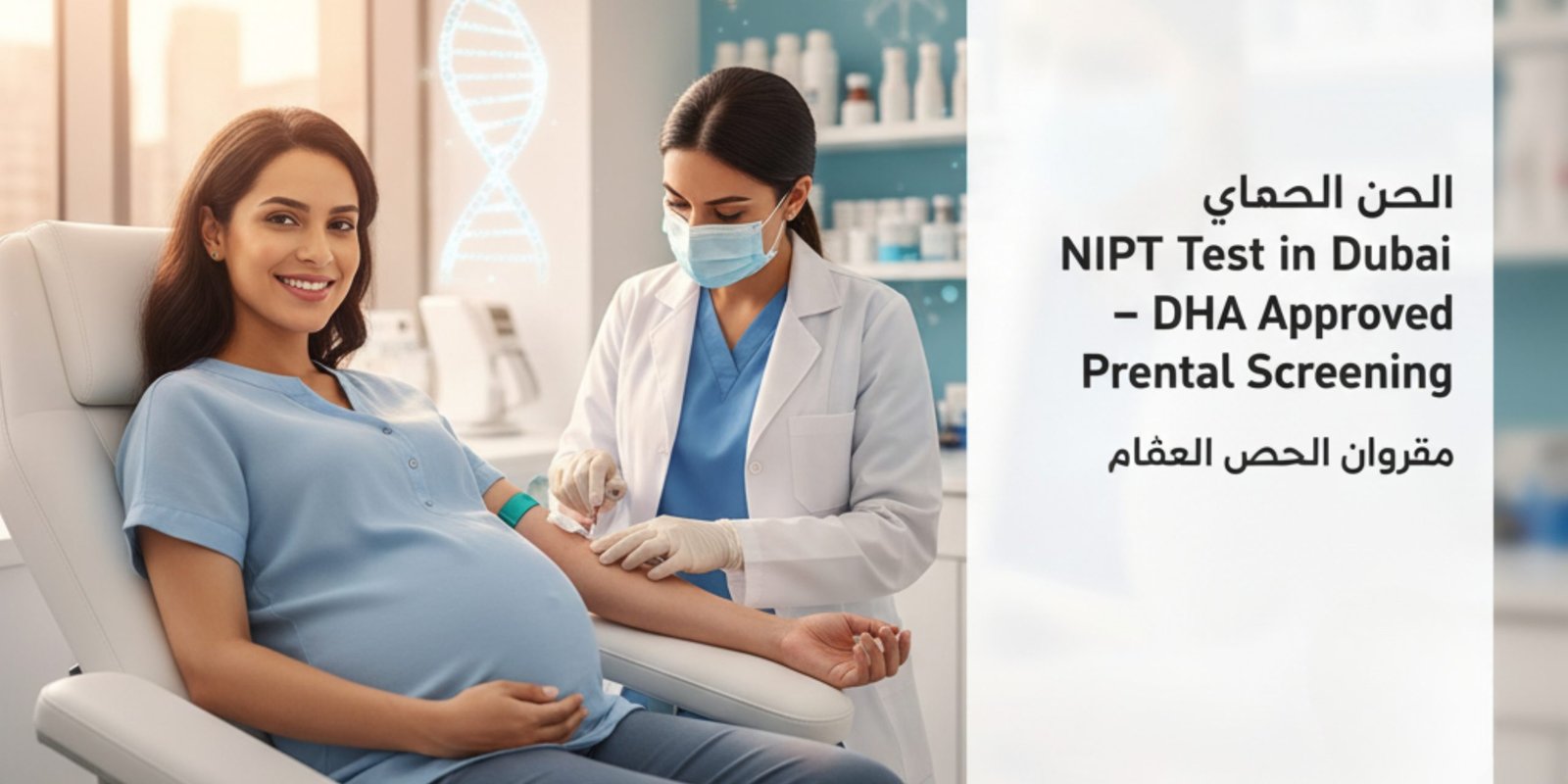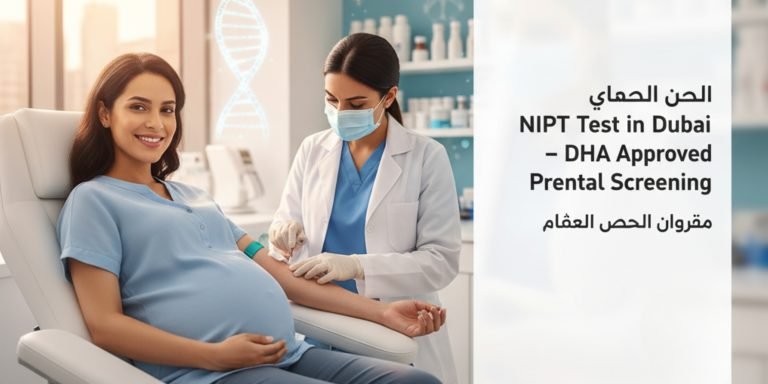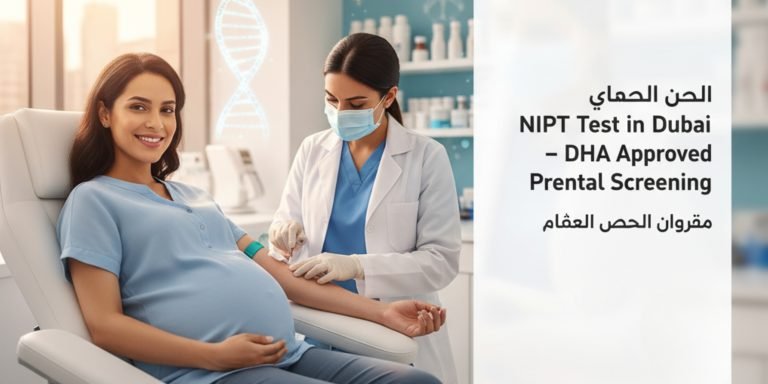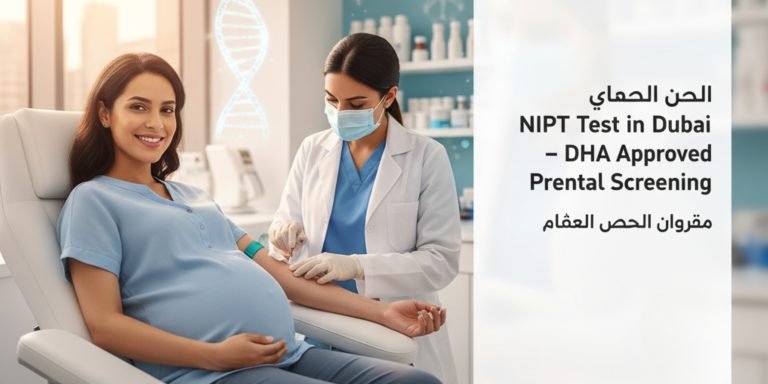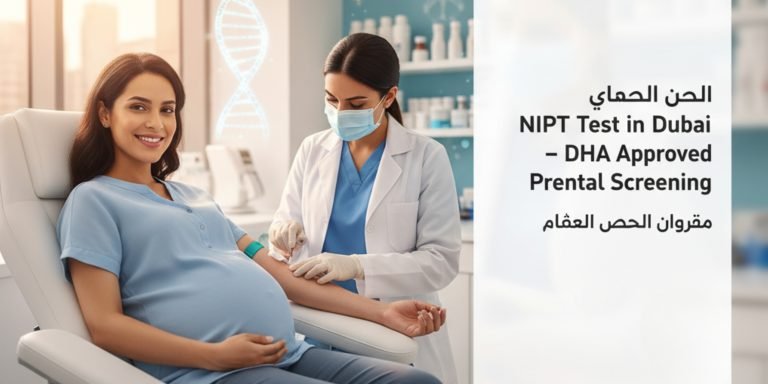NIPT Test in Al Raffa Dubai – DHA Approved Prenatal Screening
Expecting mothers in Al Raffa Dubai, Dubai, now have convenient access to DHA-approved Non-Invasive Prenatal Testing (NIPT) through Lab Tests Dubai. This advanced DNA-based screening provides early insights into your baby’s chromosomal health — helping detect common genetic conditions such as Down syndrome (Trisomy 21), Edwards syndrome (Trisomy 18), and Patau syndrome (Trisomy 13) with exceptional accuracy and zero risk to your pregnancy.
From just 10 weeks of gestation, a simple maternal blood sample can reveal vital information about your baby’s genetic well-being — without any invasive procedure or hospital visit. Our DHA-certified lab ensures every test is conducted with precision, confidentiality, and compassion, supporting parents through this important stage of prenatal care.

If you’re located near BurJuman or Deira, explore our nearby NIPT service locations:
👉 NIPT Test in BurJuman Dubai
👉 NIPT Test in Deira Dubai
Both nearby areas are supported by our DHA-approved labs offering home sample collection and same-day testing.
What is NIPT and How Does It Work?
Non-Invasive Prenatal Testing (NIPT) is a sophisticated screening test that examines tiny fragments of fetal DNA found in your bloodstream. By analyzing this cell-free DNA, labs can assess the likelihood of certain chromosomal conditions. A simple blood draw from the mother is all that’s needed. The isolated DNA is then sequenced to identify specific chromosomal regions, generating a risk score for conditions like Down syndrome. This method allows for early screening without the need for invasive procedures, supporting informed decisions from the very first trimester. As a screening tool, NIPT enhances prenatal care by highlighting pregnancies that might benefit from further diagnostic testing or specialist consultation.
What Conditions Does NIPT Screen For?
Before diving into the risks and limitations, it’s helpful to know the primary chromosomal abnormalities NIPT typically screens for:
- Down syndrome (Trisomy 21)
- Edwards syndrome (Trisomy 18)
- Patau syndrome (Trisomy 13)
- Sex chromosome aneuploidies (such as Turner syndrome)
These are the main targets, focusing on common and significant genetic conditions. Understanding this specific panel helps clarify why other tests might be necessary for different concerns.
Why is NIPT Considered a Screening Test, Not Diagnostic?
NIPT works by assessing risk and reporting probabilities, rather than providing a definitive diagnosis. A high-risk result indicates an increased chance of a chromosomal abnormality, but it requires confirmation through invasive diagnostic procedures like amniocentesis or chorionic villus sampling (CVS). This screening approach helps minimize unnecessary invasive testing while identifying pregnancies that need further investigation and specialized genetic counseling.
How Early Can NIPT Be Performed During Pregnancy?
You can typically have an NIPT test from 10 weeks of pregnancy onwards. This timing is important because by this stage, there’s usually enough fetal DNA in your blood (fetal fraction) for reliable analysis. Early screening provides more time for follow-up consultations and planning if the results indicate an increased risk. Testing too early might result in insufficient fetal DNA, potentially leading to inconclusive results and the need for a repeat test later in the first trimester.
What Are the Main Risks of NIPT Testing?
The physical risks associated with NIPT are minimal, as it only requires a standard blood draw. However, the outcomes of the screening can present medical and emotional considerations. Potential false positive or false negative results, as well as inconclusive outcomes, can cause anxiety or delay important decisions. Understanding these potential outcomes helps you view NIPT as one part of your overall prenatal care plan, rather than a final verdict on your baby’s health.
What Causes False Positive NIPT Results and What Do They Mean?
A false positive occurs when the NIPT screening indicates a high risk for a condition, but the baby does not actually have it. Common reasons for this include:
- Placental mosaicism: Where the cells in the placenta have a different genetic makeup than the fetus.
- Vanishing twin: If you were carrying more than one baby and one did not survive, residual DNA from the demised twin can affect the test results.
- Maternal chromosomal conditions: In rare cases, the mother may have a chromosomal abnormality or a condition like malignancy that can influence the test.
These factors can lead to an elevated risk score, highlighting why a positive NIPT result always needs confirmation with diagnostic tests like amniocentesis or CVS before making any major decisions.
NIPT: Sensitivity, Specificity, and Existing False Results
The non-invasive prenatal testing that evaluates circulating cell free DNA, and has been established as an additional pregnancy test for detecting the common fetal trisomies 21, 18 and 13 is rapidly revolutionizing prenatal screening as a result of its increased sensitivity and specificity. However, false positive and false negative results still exist.
A case of placental trisomy 18 mosaicism causing a false negative NIPT result, 2017
How Common Are False Negative Results and What Are Their Implications?
False negatives are uncommon, occurring when a chromosomal abnormality is present but the NIPT screening fails to detect it. For major trisomies, the rate is typically less than 1 percent. However, if a diagnosis is missed, it can delay necessary prenatal interventions. If there’s a clinical concern despite a low-risk NIPT result, confirmatory invasive testing remains the most reliable way to rule out any remaining risk.
NIPT for Aneuploidy Screening: False Positives and Negatives
Non-invasive prenatal testing (NIPT) using cell-free DNA has been widely used for prenatal screening to detect the common fetal aneuploidies (such as trisomy 21, 18, and 13). NIPT has been shown to be highly sensitive and specific in previous studies, but false positives (FPs) and false negatives (FNs) occur. Although the prevalence of FN NIPT results for Down syndrome is rare, the impact on families and society is significant.
Two cases of placental trisomy 21 mosaicism causing false-negative NIPT results, 2023
Why Do Inconclusive or No Results Occur in NIPT Testing?
Inconclusive results can happen when the amount of fetal DNA in your blood is too low for analysis, or if there are technical issues during the testing process. Key factors include:
- Low fetal fraction: This can be due to testing too early in pregnancy or a higher maternal Body Mass Index (BMI).
- Sample issues: Degradation of the sample during transport or delays in processing.
- Blood composition: Certain substances in maternal blood, like lipids or medications, can sometimes interfere with the analysis.
Often, these situations can be resolved by repeating the NIPT test a couple of weeks later or by considering alternative testing methods, ensuring you eventually receive actionable information.
How Can NIPT Results Affect Emotional Well-being and Anxiety?
Even when NIPT results are accurate, they can bring about stress and uncertainty. A high-risk result can cause immediate worry, while inconclusive results might prolong a period of indecision. Engaging with a genetic counselor early on can be very helpful. They can provide support, explain the implications of the results within a clear framework of next steps, and connect you with available resources.
What Are the Key Limitations of NIPT Testing?
While NIPT is highly accurate for common trisomies (often over 99% for Down syndrome), it has certain limitations regarding the scope of conditions it covers and its reliability in specific situations. Understanding these limitations helps you set realistic expectations and know when additional testing might be beneficial.
Why Is NIPT Not a Definitive Diagnostic Test?
NIPT provides risk probabilities, not definitive diagnoses. Only by analyzing fetal cells obtained through invasive procedures can chromosomal abnormalities be confirmed. Tests like amniocentesis and CVS directly examine fetal cells, offering conclusive results. Therefore, any high-risk NIPT result must be verified through diagnostic testing before making critical decisions about your pregnancy.
| Test Type | Invasiveness | Accuracy | Miscarriage Risk | Typical Use |
|---|---|---|---|---|
| NIPT Screening | Non-invasive | >99% for trisomy 21 | None | Initial risk assessment |
| Amniocentesis | Invasive | ~99.9% diagnostic accuracy | 0.1–0.3% | Confirmation of high-risk NIPT |
| CVS | Invasive | ~98–99% diagnostic accuracy | 0.5–1% | Early diagnostic confirmation |
Which Genetic Conditions Are Not Covered by NIPT?
NIPT does not screen for:
- Microdeletion syndromes (e.g., DiGeorge syndrome)
- Single-gene disorders (such as cystic fibrosis)
- Structural birth defects (like neural tube defects)
Because of these gaps, other specialized tests and detailed ultrasound examinations remain essential parts of comprehensive prenatal screening.
How Do Multiple Pregnancies and High Maternal BMI Affect NIPT Accuracy?
In cases of twin, triplet, or higher multiple pregnancies, the presence of DNA from multiple fetuses can reduce the sensitivity of NIPT. Similarly, a higher maternal BMI can dilute the fetal DNA in your blood, increasing the likelihood of inconclusive results. For multiple pregnancies or when maternal BMI is high, alternative strategies like targeted ultrasounds or invasive testing might be recommended to ensure accurate risk assessment.
What Ethical Considerations Should Expecting Parents Know About NIPT?
The decision to undergo NIPT involves personal values, cultural beliefs, and an understanding of the potential outcomes. Genetic counseling can provide balanced information about the implications of screening, confidentiality, and your autonomy in decision-making. Respecting diverse perspectives on prenatal screening ensures that families can make choices that align with their ethical frameworks.
How Is NIPT Testing Regulated and Available in Al Raffa Dubai, Dubai?
In Al Raffa Dubai, all prenatal screening services must comply with the stringent standards set by the Dubai Health Authority (DHA). These regulations cover test quality, provider qualifications, and reporting procedures. Understanding the local regulatory landscape and available service options ensures you receive safe, reliable, and accessible care.
What Does DHA Approval Mean for NIPT Services in Al Raffa Dubai?
DHA approval signifies that a laboratory meets rigorous criteria for its equipment, staff expertise, test validation processes, and data security. Choosing a DHA-approved provider assures you that the service adheres to the latest clinical guidelines and that you can trust the screening results.
How Does Home Sample Collection Work for NIPT in Al Raffa Dubai?
Lab Tests Dubai offers a convenient home sample collection for NIPT in Al Raffa Dubai. A trained phlebotomist will visit your home to collect the necessary maternal blood sample. The sample is then transported under controlled conditions to a DHA-approved laboratory for accurate NIPT analysis. This service minimizes the need for clinic visits while ensuring the integrity of your sample.
What Are the Typical Costs and Insurance Options for NIPT in Al Raffa Dubai?
The cost of NIPT in Al Raffa Dubai typically ranges from AED 1,200 to AED 3,800, though prices can vary. Many health insurance plans offer coverage for NIPT when it’s medically recommended, depending on your specific policy. It’s always a good idea to verify coverage details with your insurer before your test to manage potential out-of-pocket expenses.
How Should Al Raffa Dubai Residents Interpret NIPT Results?
Understanding your NIPT results involves recognizing the risk categories, knowing the recommended next steps, and integrating this information into your overall prenatal plan. Clear interpretation can help reduce anxiety and ensure you receive appropriate follow-up care.
What Does a Low-Risk NIPT Result Indicate?
A low-risk NIPT result suggests that the probability of the screened chromosomal abnormalities is similar to or lower than the general population risk. While this is reassuring, it doesn’t eliminate all potential genetic risks. Routine prenatal monitoring, including standard ultrasounds and clinical assessments, should continue as usual.
What Should You Do After a High-Risk NIPT Result?
If your NIPT result indicates a high risk, it’s important to seek prompt referral to a genetic counselor. They can discuss diagnostic testing options (like amniocentesis or CVS), review your personal and family medical history, and help you plan for confirmatory testing. Early consultation ensures you receive precise information for informed decision-making.
How to Handle Inconclusive or Unclear NIPT Results?
If your NIPT results are inconclusive, you might consider repeating the test after two weeks or exploring alternative assessments, such as a detailed ultrasound or invasive diagnostic testing. Open communication with your healthcare provider is key to resolving uncertainty efficiently and minimizing emotional strain.
When Is NIPT Not Recommended or Less Accurate?
In certain situations, NIPT may be less reliable or direct diagnostic testing might be more appropriate. Knowing these scenarios can help prevent misleading results and ensure safe prenatal care.
Why Might NIPT Be Unsuitable for Multiple or High-Risk Pregnancies?
For pregnancies involving non-identical twins, triplets, or more, the mixed fetal DNA signals can complicate risk interpretation and increase the chance of test failure. High-risk pregnancies due to maternal health conditions, such as autoimmune diseases, might also benefit more from direct diagnostic testing to avoid potentially ambiguous screening outcomes.
What Factors Can Lead to NIPT Test Failure or Inaccuracy?
Factors that can compromise NIPT accuracy include:
- Recent blood transfusions or organ transplants, which can introduce non-fetal DNA.
- Extremely low fetal fraction (less than 4 percent).
- Laboratory processing errors or improper sample handling.
Discussing these potential issues with your provider beforehand can help guide alternative testing strategies and prevent delays.
How Does NIPT Compare to Diagnostic Tests Like Amniocentesis and CVS?
When screening results suggest an elevated risk, understanding the differences between NIPT and invasive diagnostic tests can help you make informed choices about your options and their associated trade-offs.
What Are the Differences Between NIPT and Amniocentesis?
NIPT is a non-invasive blood test that provides early risk estimates for common trisomies with high sensitivity. Amniocentesis, on the other hand, involves collecting amniotic fluid using a needle guided by ultrasound. It provides definitive chromosomal and genetic analysis but carries a small miscarriage risk of 0.1–0.3 percent.
Explore all types of Home Blood Tests in Dubai
When Should Expecting Parents Consider Diagnostic Testing After NIPT?
Diagnostic testing is recommended if NIPT results show a high risk, if structural abnormalities are detected during an ultrasound, or if a family history suggests a concern for genetic conditions not covered by NIPT. The timing for these tests typically ranges from 11 to 20 weeks of gestation, depending on the specific procedure.
What Are the Risks Associated with Invasive Diagnostic Procedures?
Besides the risk of miscarriage, invasive procedures like amniocentesis and CVS can potentially cause cramping, bleeding, or infection. Choosing a skilled provider within a DHA-approved facility helps minimize these risks and ensures safe diagnostic follow-up.
What Are Common Questions About NIPT Risks and Limitations in Dubai?
Residents in Dubai often seek clear answers regarding NIPT accuracy, local factors, emotional support, and access to qualified providers when considering this screening test.
How Accurate Is the NIPT Test in Dubai and the UAE?
Recent laboratory validations (2023–2025) confirm that NIPT accuracy in Dubai and the UAE exceeds 99 percent for Down syndrome screening and is over 95 percent for Edwards and Patau syndromes. These ps are comparable to international standards and are supported by DHA oversight.
What Causes False Positive NIPT Results in Dubai Residents?
Factors that can contribute to false positive NIPT results among Dubai residents include increased maternal age, the prevalence of placental mosaicism, and, in rare instances, residual DNA from a vanishing twin. Recognizing these factors reinforces the importance of confirmatory testing before making any decisions.
How Can Expecting Parents Manage Anxiety Related to NIPT Results?
Accessing professional genetic counseling, participating in support groups, and discussing results with trusted healthcare providers can significantly help manage anxiety. Many DHA-approved clinics in Al Raffa Dubai offer counseling services alongside NIPT testing to support emotional well-being.
Where Can I Find DHA-Approved NIPT Providers in Al Raffa Dubai?
Residents can easily book NIPT and home sample collection services through Lab Tests Dubai’s NIPT page. This ensures you are using a DHA-accredited provider, offering convenient scheduling and expert phlebotomy services. Choosing a certified provider guarantees adherence to local standards and reliable screening processes.
NIPT offers Al Raffa Dubai families valuable early insights into their baby’s chromosomal health in a non-invasive way. However, it’s essential to understand its nature as a screening test, its potential for false or inconclusive results, and the conditions it doesn’t cover. By combining NIPT with routine prenatal monitoring, genetic counseling, and, when necessary, invasive diagnostic testing, you can make informed and confident decisions throughout your pregnancy. For DHA-approved NIPT services and convenient home blood sample collection by trained professionals, Lab Tests Dubai provides comprehensive support and expert guidance tailored to your needs in Al Raffa Dubai.
Book your NIPT Test in Dubai with Lab Tests Dubai for DHA-approved, accurate, and confidential prenatal screening — available with convenient home sample collection in Al Raffa Dubai.


